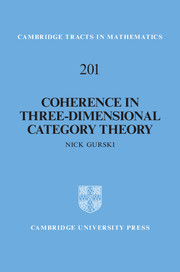Book contents
8 - Gray-categories and tricategories
from Part II - Tricategories
Published online by Cambridge University Press: 05 April 2013
Summary
In this chapter, we will establish an important relationship between categories enriched over the monoidal category Gray and certain kinds of semi-strict tricategories. The first step is to define an intermediate notion, that of a cubical tricategory. We will then show that strict, cubical tricategories are essentially Gray-categories. With this relationship in mind, we will then prove a weak form of coherence that will be necessary later, namely that every tricategory is triequivalent to a cubical one. This intermediate theorem appears in Gordon et al. (1995), and the presentation here follows that one closely. Finally, we will show that the canonical strictification B → stB for bicategories extends to a functor of tricategories st: Bicat → Gray.
Cubical tricategories
This section is devoted to proving a weak form of the coherence theorem for tricategories. The theorem proved here will be used as a stepping stone to the stronger version of coherence. This weak form will introduce many of the concepts necessary to continue, and will be a simple consequence of a few results that are important later.
Definition 8.1 A tricategory T is cubical if
(1) each bicategory T (a, b) is a strict 2-category,
(2) each functor Ia: 1 → T (a, a) is a cubical functor, and
(3) each functor ⊗: T (b, c) × T (a, b) → T (a, c) is a cubical functor.
Remark 8.2 It should be noted that condition 2 above does not appear in the definition of cubical tricategory given by Gordon et al. (1995).
- Type
- Chapter
- Information
- Coherence in Three-Dimensional Category Theory , pp. 129 - 137Publisher: Cambridge University PressPrint publication year: 2013



